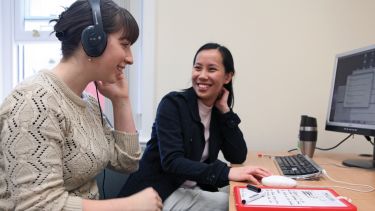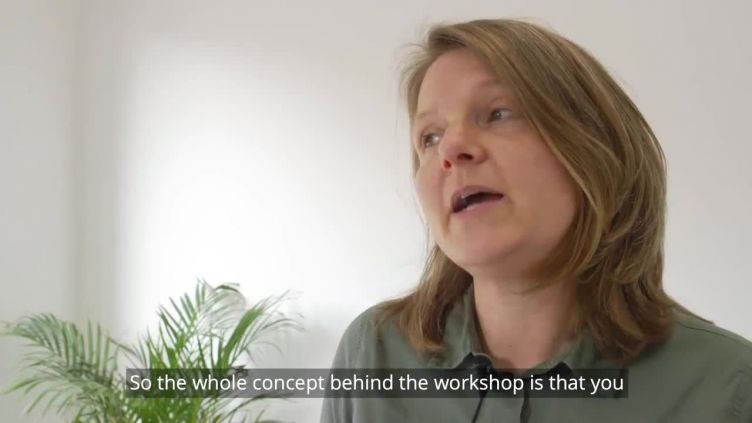Psychology of Music MA
School of Languages, Arts and Societies,
Faculty of Arts and Humanities
-
Start date
September 2026 -
Duration
1 year 2 years -
Attendance
Full-time Part-time
Explore this course:
Apply now for 2026 entry or join us on a discovery afternoon to see where a Sheffield masters could take you.

Course description
Cover the key areas and debates in music psychology, become proficient in psychological research techniques and explore the implications of psychology of music in everyday life.
You'll receive a rich grounding in areas relevant to the understanding of music cognition, the neuroscience of music; music education; music therapy and wellbeing; music in everyday and exceptional situations; and psychological approaches to performance.
You'll specialise within an area of your choice and pursue original research leading to a dissertation. The course is taught by widely-published and leading experts in the field who will guide and support you in your work.
This MA offers an unparalleled opportunity to develop your insight into music and musical experience, which will help to shape your career, whether you go on to be a researcher, teacher or practitioner.
Our school is a vibrant community of academics and students and, between us, we cover an extraordinary range of specialisms and interests. We currently have large projects on music, dementia and technology; innovation in audience experiences of classical music; and supporting socio-musical dynamics in group singing.
We have internationally recognised research centres such as Muses, Mind, Machine (MMM) and the Sheffield Performer and Audience Research Centre (SPARC), which enable collaborative and interdisciplinary work with local, national and international organisations.
These collaborations form a vibrant context for peer and mentor-led learning and act as focal points for students doing research in the school and for staff of different career stages working on projects.
Our staff are also involved in consultancy work, contributing to the arts and cultural sectors and ensuring our teaching and research is relevant to their needs.
Accreditation
We are an All-Steinway School.
Modules
Core modules. A student will take a minimum of 45 and a maximum of 60 credits from this group. 'Music, brain and body' and 'The social and applied psychology of music' can be taken with 15 or 30 credits.
- Dissertation
-
Students will be required to submit a dissertation proposal that is approved by their dissertation supervisor, and furthermore a dissertation will then be required to be completed on the agreed subject.
60 credits - Music, Brain and Body
-
In this module, you will explore the perceptual and cognitive foundations of music. Over the course of the module, we cover issues in the neuropsychology of music, examine memory processes in music, learn about the complex relationship between music and emotions and the psychological foundations of the elements of music such as pitch and rhythm. The module will give you contemporary insight and understanding of the way in which our brains and bodies engage with and process musical sound.
15 credits - Applied Music Psychology: Education, Community and Health
-
This module explores the psychology of music in a variety of settings, from the everyday uses of music to music in education and in therapeutic settings. The emphasis in this module lies in two related areas: the use of music psychology to help solve the practical problems of people's lives (in terms of wellbeing, therapy, education and development) and also to explore music as a social phenomenon, that is understanding the psychology of music as a social and interactive facet of human life.
15 credits
Optional modules. A student will take a minimum of 45 and a maximum of 60 credits from this group. Both modules can be taken with 15 or 30 credits.
- Quantitative Research Techniques
-
This module provides a research training in quantitative research techniques relevant to the study of musical behaviour. The module consists of teaching and learning of statistical techniques in a computer-lab setting, plus a group project in which an empirical study is partially designed and fully executed and analysed. The project is assessed by means of an individual report of 6,000 words.
30 credits - Qualitative Research Techniques
-
This module provides a research training in a qualititative research techniques relevant to the study of musical behaviour. This module consists of teaching and learning of qualitative research design and analysis techniques in a seminar setting, plus a group project in which an empirical study is executed and reported. This project is assessed by means of an individual report of 6,000 words.
30 credits
Optional modules: Subject to the approval of the course director. A student will take up to 45 credits from this group.
- Research and Communication Skills A
-
Research and Communication Skills A and B together comprise linked modules delivered in collaboration with the English Language Teaching Centre, directed at all students who wish to work on research and English communication skills - written and oral, in order to reach a variety of audiences interested in music and music research.
15 credits
Research and Communication Skills A runs through Semester 1 covering foundational research skills, including generating focussed research topics; literature search; critical reading; quotation, paraphrasing and summarising; citation; organising information and building academic arguments; and structuring an essay.
Research and Communication Skills B runs through Semester 2, and focuses on developing more advanced critical skills, using evidence, and written and oral communication in a variety of genres and styles. Assessments for these modules provide opportunities to improve academic research and writing skills, which can benefit performance in other modules. They also offer the opportunity to engage with a broad spectrum of written and oral communication, useful for academic and professional contexts - Research and Communication Skills B
-
Research and Communication Skills A and B together comprise linked modules delivered in collaboration with the English Language Teaching Centre, directed at all students who wish to work on research and English communication skills - written and oral, in order to reach a variety of audiences interested in music and music research. Research and Communication Skills A runs through Semester 1 covering foundational research skills, including generating focussed research topics; literature search; academic reading; quotation, paraphrasing and summarising; citation; organising information and arguments; and structuring an essay. Research and Communication Skills B runs through Semester 2, and focusses on developing critical skills, using evidence, and written and oral communication in a variety of genres and styles. Assessments for these modules provide opportunities to improve academic research and writing skills, which can benefit performance in other modules. They also offer the opportunity to engage with a broad spectrum of written and oral communication, useful for academic and professional contexts.
15 credits - Critical Musicology
-
This unit acts as an introduction to key trends and figures in musicology from the mid-twentieth century to the present day. Students will learn techniques and skills related to the literature in the field, and will employ them in an essay on a topic of their own choice.
30 credits - Research and Communication Skills A
-
Research and Communication Skills A and B together comprise linked modules delivered in collaboration with the English Language Teaching Centre, directed at all students who wish to work on research and English communication skills - written and oral, in order to reach a variety of audiences interested in music and music research.
15 credits
Research and Communication Skills A runs through Semester 1 covering foundational research skills, including generating focussed research topics; literature search; critical reading; quotation, paraphrasing and summarising; citation; organising information and building academic arguments; and structuring an essay.
Research and Communication Skills B runs through Semester 2, and focuses on developing more advanced critical skills, using evidence, and written and oral communication in a variety of genres and styles. Assessments for these modules provide opportunities to improve academic research and writing skills, which can benefit performance in other modules. They also offer the opportunity to engage with a broad spectrum of written and oral communication, useful for academic and professional contexts - Fundamentals of Cognition
-
The module provides an overview of the fundamental issues in cognitive neuroscience and its contributory disciplines. The approach taken is in terms of its development over the past 50 years, providing an overview of the key concepts in the information processing approach and in cognitive science, followed by an analysis of the advances that have been made recently using cognitive neuroscience techniques. Topics include: fundamental issues in cognition (memory, attention, learning, language); theoretical approaches including cognitive neuropsychology, symbolic and sub-symbolic modelling; and methodological issues.
15 credits - Critical Listening and the Musical Work
-
Students will consider recordings across a range of genres from European and American music to develop their critical listening skills and understanding of musical works. Classes will cover broader questions in the first half of the module, giving way to focused case studies in the second.
30 credits
Key issues may include:
what is a musical work?;
what is critical listening?;
scores and editions;
positionality;
types and values;
taste and recordings;
reception of recordings;
recording over time;
and other issues and ideas in musical listening.
Weekly listening and research tasks will contribute to an independent project, which will be assessed through a presentation and short essay. - Critical Listening and the Musical Work
-
Students will consider recordings across a range of genres from European and American music to develop their critical listening skills and understanding of musical works. Classes will cover broader questions in the first half of the module, giving way to focused case studies in the second.
15 credits
Key issues may include:
what is a musical work?;
what is critical listening?;
scores and editions;
positionality;
types and values;
taste and recordings;
reception of recordings;
recording over time;
and other issues and ideas in musical listening.
Weekly listening and research tasks will contribute to an independent project, which will be assessed through a presentation and short essay. - Strategies for Funding Music and The Arts
-
This module provides a practical exploration of funding within the music and arts sectors, equipping students with the knowledge and skills to identify funding opportunities, create compelling grant applications, and understand the nuances of monitoring and evaluation. Through a series of lectures, students will dissect current market trends in arts funding, learn quantitative and qualitative research methods for evaluation, and master the art of report writing. The module aims to demystify the process of securing funding by offering step-by-step guidance on developing successful applications, from initial research to final submission. Emphasis will be placed on understanding funders' criteria, budgeting, and the critical skill of effectively presenting proposals, ensuring students are well-prepared to navigate the competitive landscape of arts funding.
15 credits - Strategic Design Thinking for Music Consultancy
-
The module consists of students working as a team with a live client from the world of professional music to address an issue of the client's choice. The issues sought from prospective client organisations will be those which either have a long term strategic bearing on the organisations's work and existence, or which address an immediate operational issue or set of issues. In both instances the issues to be studied will be typical of what might be expected to be encountered in the real world of music management. Once the definition of the issue to be studied has been fully agreed with the cilent, the course will consist of weekly seminars at which the team will plan reasearch into the issue and will discuss on a regular basis its ideas and proposals for action with the course tutor. The progress of the team will be checked with the client at the mid-point of the semester. The final outcome of the project will be a live presentation by the team to the client outlining its research findings, its interpretation of these, followed by conclusions and recommendations. This presentation in turn will be followed by the creation of a written group report which will be the subject of formal assessment and then made available for the client to use as they choose Assessment will also include peer-group assessment by the students of themselves.
15 credits
The content of our courses is reviewed annually to make sure it's up-to-date and relevant. Individual modules are occasionally updated or withdrawn. This is in response to discoveries through our world-leading research; funding changes; professional accreditation requirements; student or employer feedback; outcomes of reviews; and variations in staff or student numbers. In the event of any change we will inform students and take reasonable steps to minimise disruption.
Open days
Interested in postgraduate taught study? Join us on a discovery afternoon to see where a Sheffield masters could take you or register your interest in studying at Sheffield.
Duration
1 year full time
2 years part time
Teaching
You’ll learn through lectures, lab-sessions, and tutorials. These are combined with departmental study days and extracurricular performance opportunities, all of which makes for a stimulating and supportive study environment.
School of Languages, Arts and Societies students study at the heart of the campus in our Jessop Building, Soundhouse and performance facilities. We timetable teaching across the whole of our campus.
- Learn more about your supervisors
Changes to the teaching staff on the programme are possible, but are likely to include:
Assessment
The taught programme is continuously assessed through a variety of forms such as reports and essays. They are usually individual assessments, even if they concern the processes and outcomes of group work.
Your career
Many of our graduates have found success within music therapy and performance, while a large number have gone onto teach or work in creative arts organisations. Others have stayed to continue their studies at PhD level, or taken up offers to study further at leading music conservatoires.
By joining a leading Russell Group university you'll experience an outstanding teaching and learning environment. The multidisciplinary approach will provide you with a well-rounded skill set to succeed in a wide range of rewarding career paths.
School
School of Languages, Arts and Societies
Music at Sheffield, situated within the School of Languages, Arts and Societies, has a distinguished heritage of musical scholarship and creative practice. Established in 1927, it has evolved into one of the UK's most diverse music departments, balancing traditional musicological study with cutting-edge research and performance.
Music at Sheffield has particular expertise in musicology, ethnomusicology, composition, performance, music psychology, music technology and global music industries. This breadth of specialisms creates a rich academic environment where traditional approaches meet innovative thinking about music's role in society and culture.
Based in the Jessop Building, music at Sheffield benefits from purpose-built facilities including seminar rooms, practice spaces and specialised research areas. The adjacent SoundHouse provides professional-standard recording studios, rehearsal rooms and music technology suites where students can develop practical skills alongside theoretical knowledge. Music at Sheffield also utilises performance venues across campus, including the Firth Hall and the Drama Studio, for student and professional concerts.
Student profiles
My experience studying MA Psychology of Music
Verna Vazquez Diaz
MA Psychology of Music,
Graduate
Entry requirements
Minimum 2:1 undergraduate honours degree in a relevant subject.
Subject requirements
We accept degrees where either Music or Psychology is a named component.
We may also consider other degree subjects if you can evidence engagement with music, for example through modules studied, professional or amateur music performance, etc.
English language requirements
IELTS 6.5 (with 6 in each component) or University equivalent.
Other requirements
If you have any questions about entry requirements, please contact the school.
Fees and funding
Save on your course fees
Apply
You can apply now using our Postgraduate Online Application Form. It's a quick and easy process.
Contact
Any supervisors and research areas listed are indicative and may change before the start of the course.
Recognition of professional qualifications: from 1 January 2021, in order to have any UK professional qualifications recognised for work in an EU country across a number of regulated and other professions you need to apply to the host country for recognition. Read information from the UK government and the EU Regulated Professions Database.









